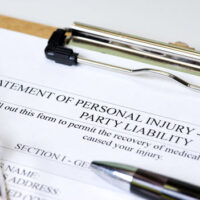How to File Your Taxes After Receiving a Personal Injury Settlement

When the victim of a personal injury receives his or her personal injury settlement, they are relieved simply because it means that they can stop worrying about how they are going to pay for their medical bills and cover their living expenses. However, that relief is oftentimes short lived, typically lasting up until tax filing season rolls around. While not all of your personal injury settlement will be considered taxable income, there are some portions that will be susceptible to IRS scrutiny. When you work with a West Palm Beach personal injury lawyer, we will advise you on all aspects of your personal injury claim, including what happens after you receive your settlement. This way there are no unwanted surprises at the end of the day.
Personal Injury Damages That Do Not Count as Taxable Income
While the IRS typically does not go after personal injury settlements, they do, on occasion, look at some compensation as taxable income. However, they will not touch compensation from the following:
- Compensation for Physical Injury and Sickness.
If you sustained a physical injury or sickness (such as one from an airborne toxin in the workplace), and you won your personal injury claim, the IRS will not ask you to claim your settlement as part of your yearly income. However, if you paid for your medical expenses out of pocket prior to receiving your settlement, and if you claimed those medical bills on a previous year’s tax return, you must report the amount that you deducted from your taxes.
- Compensation for Emotional Distress.
If part of your settlement was for emotional distress that resulted from your injury or illness, you will not need to report it to the IRS. However, if your emotional distress did not originate from your injury or illness, and if it was just a byproduct of the accident, you may have to claim the portion of compensation allocated towards emotional distress in this year’s tax return. However, the amount that you will be taxed can be reduced by the amount that you paid for medical expenses.
- Compensation for Lost Wages.
If you were unable to work at all throughout the year because of your injury or illness, if you routinely missed work because of doctor appointments, or if you experienced a decrease in earning capacity, you can claim “lost wages.” When you claim lost wages because of an injury or illness, the compensation you receive will not be taxable. However, if you receive damages for lost wages due to an employment discrimination lawsuit or wrongful termination claim, you may have to include the compensation for lost wages as part of your taxable income.
- Compensation for Punitive Damages.
Finally, if you receive damages meant to punish someone else for their negligent or careless behavior, then part of your settlement award may be considered taxable income.
For the most part, the compensation from a personal injury settlement is only non-taxable when the money is allocated towards injury or illness, and damages that stem from injury or illness. However, to err on the side of caution when planning for your finances for the year, reach out to the personal injury lawyers at The Pendas Law Firm for guidance regarding your claim.
Consult a West Palm Beach Personal Injury Lawyer
With tax season just around the corner, it is imperative that you understand what part, if any, of your personal injury settlement will be counted as taxable income. Without taking into consideration your personal injury compensation, you may unwittingly move yourself into the next tax bracket, or disqualify yourself for certain credits and deductions. To learn more about how your personal injury compensation will affect your taxes, call The Pendas Law Firm at 1-844-200-0000 to speak with a West Palm Beach personal injury lawyer today.
The Pendas Law Firm also serves clients in the Tampa, Fort Lauderdale, Orlando, Fort Myers, Miami, Daytona, Bradenton, and Jacksonville areas.






